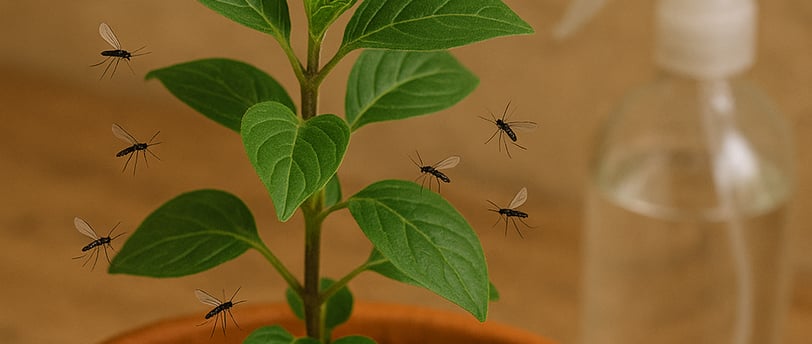How to Get Rid of Fungus Gnats in Potted Plants Naturally
Got tiny flies in your plants? Learn how to get rid of fungus gnats naturally with simple, effective tips to protect your herbs and houseplants.
PESTS & PROBLEMS


Noticed tiny black flies buzzing around your potted plants? Chances are, you're dealing with fungus gnats—one of the most annoying and common indoor plant pests.
While they might seem harmless, fungus gnat larvae can damage roots, slow plant growth, and even kill seedlings. The good news? You can eliminate them without using harsh chemicals.
Here’s how to identify, control, and prevent fungus gnats naturally.
🕵️♂️ What Are Fungus Gnats?
Fungus gnats are tiny black flies, often mistaken for fruit flies. Adults are harmless but lay eggs in moist soil. The larvae feed on organic matter and plant roots, damaging seedlings and young herbs.
🧪 Signs of Fungus Gnats
Small black flies near the soil or flying around when you water
Yellowing or stunted plants (especially young ones)
Larvae: tiny, white, worm-like creatures in the topsoil
❌ Why Fungus Gnats Are a Problem
Larvae damage roots, weakening your plants
They multiply fast in moist soil
They’re annoying indoors and hard to get rid of if ignored
🛠️ Natural Ways to Get Rid of Them
1. Let Soil Dry Between Watering
Gnats thrive in constantly moist soil. Let the top 1–2 inches dry completely.
2. Sticky Traps
Place yellow sticky traps near the base of the plant. These catch adult gnats before they lay eggs.
3. Hydrogen Peroxide Soil Flush
Mix 1 part 3% hydrogen peroxide with 4 parts water. Water the soil with this once to kill larvae without harming the plant.
4. Bottom Watering
Avoid watering from the top. Place pots in a tray of water and let the soil absorb it from below to keep the top layer dry.
5. Neem Oil or Mosquito Bits
Neem oil drenches or mosquito dunks (Bacillus thuringiensis israelensis) are natural biological controls that kill larvae.
🧹 Prevent Fungus Gnats Long-Term
Use well-draining soil—no compost or unsterilized dirt indoors
Remove dead leaves or debris from soil surface
Add a layer of sand or diatomaceous earth on top of the soil
Don’t reuse old potting mix unless sterilized
Final Thoughts
Fungus gnats are annoying, but they’re manageable—especially if you catch them early. A dry topsoil, natural traps, and biological treatments are your best defense. Keep your indoor plants (and herbs) healthy by keeping those gnats away for good.
